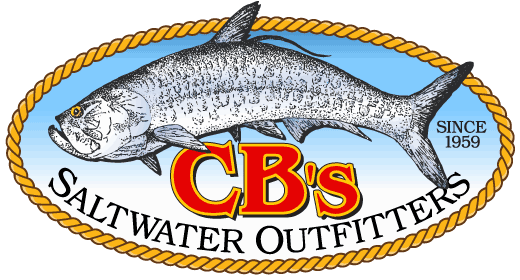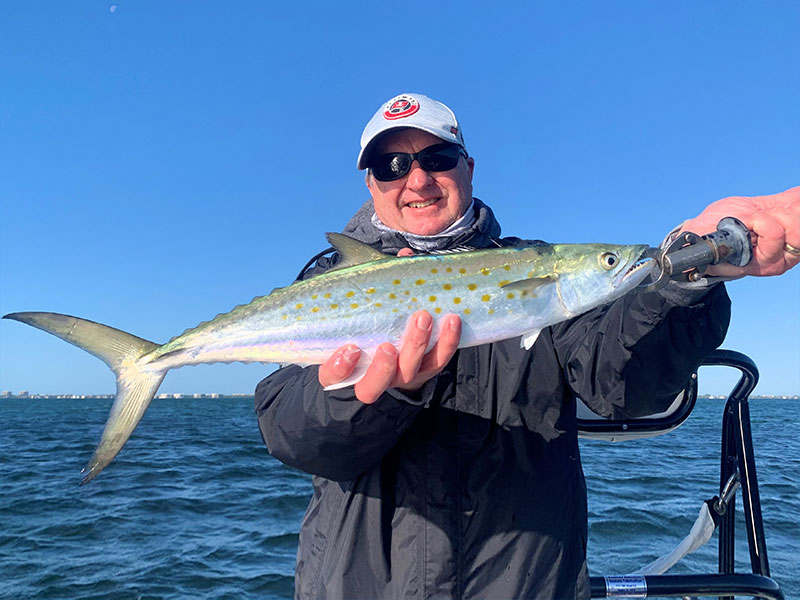This is a great month for snook on shallow flats. Reds and trout will also be more active as the water warms and baitfish become more plentiful. You might find Spanish mackerel, blues and pompano in passes or on deep grass flats. You should also find Spanish mackerel along with false albacore (little tunny), cobia and tripletail, in the coastal gulf this month. Tarpon should also make an appearance in bay or back country areas or along beaches by later in the month.
Tarpon will become more plentiful as resident fish make their way out of rivers and creeks and early arriving migratory fish begin to show along beaches, particularly by the end of the month. Water temperature in the gulf is a key factor with 80 degrees being an optimum temperature. As the water warms towards that, fish will become more plentiful.
Resident fish may be rolling on deep grass flats in some of the same places that you find trout, laid up on edges of shallow grass flats or along sand bars. Fly anglers might connect with a black Deceiver or Tarpon bunny fly fished on a 12-weight fly rod with a floating or clear sink tip fly line depending on depth. I always have tarpon tackle, rigged and ready, on the boat this time of year.
Spotted Seatrout regulations have changed in southwest Florida to a 3 fish per person, bag limit and a 6 fish boat limit. Trout must be from 15”-19” with one allowed per vessel over 19”. In my opinion it’s important to protect larger trout, which are usually female breeders. Full regulations and details for all species can be viewed at www.myfwc.com.
Snook should be staging on flats, around sand and oyster bars, on points of islands and around docks and bridges close to passes in the ICW. Fish the edges of bars and potholes when the tide is low and mangrove shorelines or points of islands when the tide is high. I like wide profile flies, such as Lefty’s Deceiver, my Grassett Flats Bunny or EP flies, for snook on the flats
You’ll also find snook around docks and bridges in the ICW. Night snook fishing should be productive with small white flies, like my Grassett Snook Minnow fly, shrimp patterns or Shrimp Gurglers. Fish peak tidal flows for the best action.
Reds will spend more time feeding on shallow flats due to more plentiful bait. Look for them in potholes, the edges of bars and around docks when the tide is low. You should find them higher on flats over shallow grass or around mangrove shorelines when the tide is high. My Grassett Flats Minnow is my “go to” fly for reds. It fishes well in shallow water and its bend back design makes it very weedless. You may also find big trout in skinny water in many of the same places that you find reds. The same flies and techniques used to find and catch reds will also work for big trout.
Trout should be plentiful on deep grass flats. I like to drift and cast ahead of my drift. Look for trout on deep grass flats with a good tidal flow and a mixture of grass and sand. Fly anglers should score with weighted flies on sink tip fly lines. I tie Clousers with Ultra Hair on long shank hooks so that they are durable and will hold up to toothy and rough mouth fish.
You might also find blues, Spanish mackerel, pompano or flounder mixed with trout on deep grass flats. The same flies and techniques that you use to find trout on deep grass will work for these species, too. You’ll need to tip your leader with wire or heavy fluorocarbon when blues and mackerel are around. I prefer heavy fluorocarbon and flies tied on long shank hooks, since that usually won’t affect the trout bite.
Blues and mackerel usually don’t feed on the surface in the bay like they do in the open gulf, but you may see bait showering or boils indicating fast moving fish, feeding just below the surface. Pompano may “skip” when you run or drift past them giving their location away. When that happens, circle back upwind and drift the area. Flounder are often found in potholes, on the edges of bars or on mud bottom.
There should be good action in the coastal gulf this month with Spanish and king mackerel, false albacore (little tunny), cobia and tripletail. Look for Spanish mackerel or albies feeding on the surface. You might find tripletail or cobia around crab trap floats. Your tarpon fly tackle can do double duty for cobia and an 8 or 9-weight fly rod will cover everything else. Artificial reefs or natural areas of hard bottom may hold any of these species. When fishing over bottom structure you will need to get your fly down in the water column to the level where fish are located, so in addition to a floating line you may need a sinking line to cover more of the water column.
April is one of my favorite months. There should be good action in the bay on both shallow and deep grass flats, in the coastal gulf for mackerel, albies, cobia and tripletail and with tarpon by the end of the month.
Our natural resources are under constant pressure from red tides fueled by industrial, agricultural and residential runoff, freezes, increasing fishing pressure and habitat loss and degradation, please limit your kill, don’t kill your limit!
This is a great month for snook on shallow flats. Reds and trout will also be more active as the water warms and baitfish become more plentiful. You might find Spanish mackerel, blues and pompano in passes or on deep grass flats. You should also find Spanish mackerel along with false albacore (little tunny), cobia and tripletail, in the coastal gulf this month. Tarpon should also make an appearance in bay or back country areas or along beaches by later in the month.
Tarpon will become more plentiful as resident fish make their way out of rivers and creeks and early arriving migratory fish begin to show along beaches, particularly by the end of the month. Water temperature in the gulf is a key factor with 80 degrees being an optimum temperature. As the water warms towards that, fish will become more plentiful.
Resident fish may be rolling on deep grass flats in some of the same places that you find trout, laid up on edges of shallow grass flats or along sand bars. Fly anglers might connect with a black Deceiver or Tarpon bunny fly fished on a 12-weight fly rod with a floating or clear sink tip fly line depending on depth. I always have tarpon tackle, rigged and ready, on the boat this time of year.
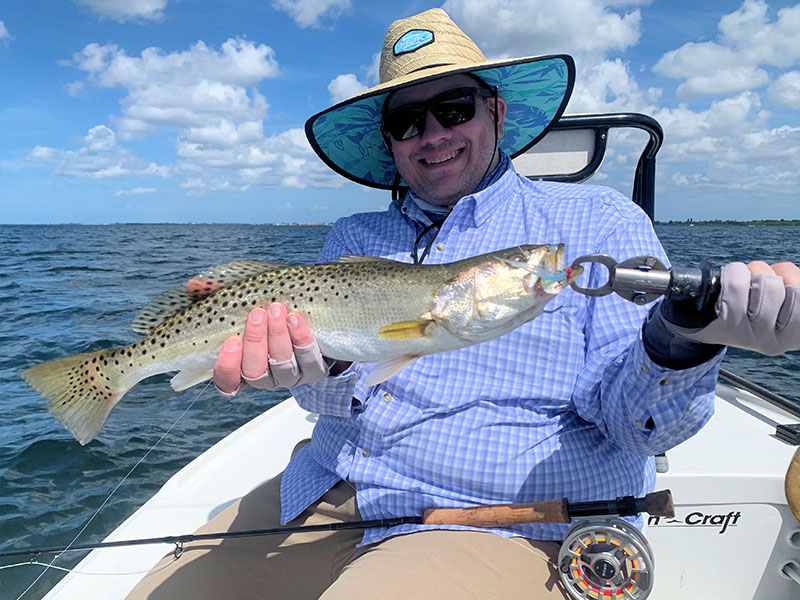
There should be good fly fishing action over deep grass in April. Bill Kempey, from NJ, with a trout.
Spotted Seatrout regulations have changed in southwest Florida to a 3 fish per person, bag limit and a 6 fish boat limit. Trout must be from 15”-19” with one allowed per vessel over 19”. In my opinion it’s important to protect larger trout, which are usually female breeders. Full regulations and details for all species can be viewed at www.myfwc.com.
Snook should be staging on flats, around sand and oyster bars, on points of islands and around docks and bridges close to passes in the ICW. Fish the edges of bars and potholes when the tide is low and mangrove shorelines or points of islands when the tide is high. I like wide profile flies, such as Lefty’s Deceiver, my Grassett Flats Bunny or EP flies, for snook on the flats
You’ll also find snook around docks and bridges in the ICW. Night snook fishing should be productive with small white flies, like my Grassett Snook Minnow fly, shrimp patterns or Shrimp Gurglers. Fish peak tidal flows for the best action.
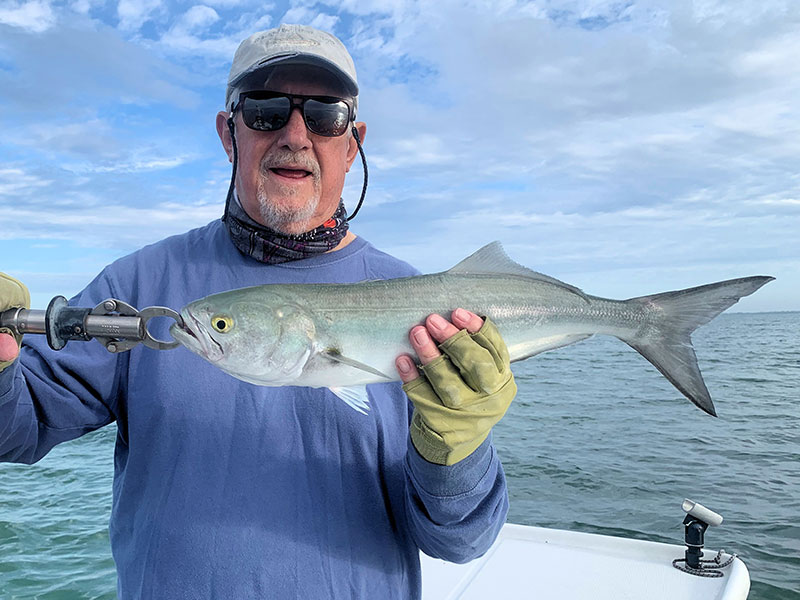
Bill Morrison, from Anna Maria Island, with a bluefish, both caught and released while fly fishing Sarasota Bay with Capt. Rick Grassett in a previous April.
Reds will spend more time feeding on shallow flats due to more plentiful bait. Look for them in potholes, the edges of bars and around docks when the tide is low. You should find them higher on flats over shallow grass or around mangrove shorelines when the tide is high. My Grassett Flats Minnow is my “go to” fly for reds. It fishes well in shallow water and its bend back design makes it very weedless. You may also find big trout in skinny water in many of the same places that you find reds. The same flies and techniques used to find and catch reds will also work for big trout.
Trout should be plentiful on deep grass flats. I like to drift and cast ahead of my drift. Look for trout on deep grass flats with a good tidal flow and a mixture of grass and sand. Fly anglers should score with weighted flies on sink tip fly lines. I tie Clousers with Ultra Hair on long shank hooks so that they are durable and will hold up to toothy and rough mouth fish.
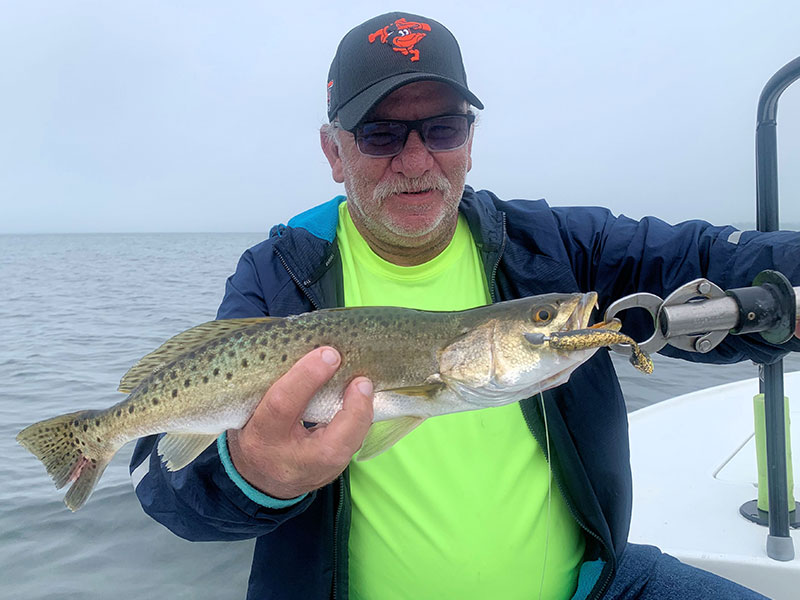
Joey Grassett, from Seaford, DE, with a trout caught on a CAL jig with a shad tail while fishing Sarasota Bay with Capt. Rick Grassett in a previous April.
You might also find blues, Spanish mackerel, pompano or flounder mixed with trout on deep grass flats. The same flies and techniques that you use to find trout on deep grass will work for these species, too. You’ll need to tip your leader with wire or heavy fluorocarbon when blues and mackerel are around. I prefer heavy fluorocarbon and flies tied on long shank hooks, since that usually won’t affect the trout bite.
Blues and mackerel usually don’t feed on the surface in the bay like they do in the open gulf, but you may see bait showering or boils indicating fast moving fish, feeding just below the surface. Pompano may “skip” when you run or drift past them giving their location away. When that happens, circle back upwind and drift the area. Flounder are often found in potholes, on the edges of bars or on mud bottom.
There should be good action in the coastal gulf this month with Spanish and king mackerel, false albacore (little tunny), cobia and tripletail. Look for Spanish mackerel or albies feeding on the surface. You might find tripletail or cobia around crab trap floats. Your tarpon fly tackle can do double duty for cobia and an 8 or 9-weight fly rod will cover everything else. Artificial reefs or natural areas of hard bottom may hold any of these species. When fishing over bottom structure you will need to get your fly down in the water column to the level where fish are located, so in addition to a floating line you may need a sinking line to cover more of the water column.
April is one of my favorite months. There should be good action in the bay on both shallow and deep grass flats, in the coastal gulf for mackerel, albies, cobia and tripletail and with tarpon by the end of the month.
Our natural resources are under constant pressure from red tides fueled by industrial, agricultural and residential runoff, freezes, increasing fishing pressure and habitat loss and degradation, please limit your kill, don’t kill your limit!
